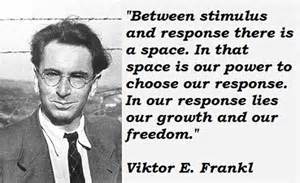We fear loss of control. We fear finding ourselves at the mercy of another person or of events “out of our control.” Suppose we experience a sudden accident, lose our job or our house in a recession, or suffer from an act of terrorism?
Perhaps wisdom begins with the possibility of failure. We can work for a certain end, for job advancement, for our candidate in a political race. We will not always win, or we may be disappointed when we do win and find it isn’t as rewarding as we thought it would be.
We may pray with Saint Augustine to change the things we can but accept the things we cannot. We relinquish, little by little, the idea that we are God.
 When circumstances beyond our control and not of our making place us in bad, even horrible situations, we can remember the lessons of Viktor Frankl. Imprisoned in a German concentration camp, at the mercy of those who hated his race, Frankl continued to develop his inner thoughts and ideas. After release from the camp, Frankl expressed those ideas in a book read by millions, Man’s Search for Meaning.
When circumstances beyond our control and not of our making place us in bad, even horrible situations, we can remember the lessons of Viktor Frankl. Imprisoned in a German concentration camp, at the mercy of those who hated his race, Frankl continued to develop his inner thoughts and ideas. After release from the camp, Frankl expressed those ideas in a book read by millions, Man’s Search for Meaning.
We may not be able to control what happens to us, he said, but we have a choice as to how we react to those circumstances.

